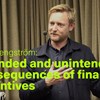unintendedly

Erik Wengström: Intended and unintended consequences of financial incentives
Erik Wengström, Professor of Economics at Lund University and Distinguished Senior Fellow at Hanken School of Economics / Helsinki Graduate School of Economics. His research focuses primarily on how pe
Research seminar: Erik Wengström - Intended and unintended consequences of financial incentives
Place: Holländargatan 13, Stockholm, or online Research seminar with Erik Wengström, Professor of Economics at Lund University and Distinguished Senior Fellow at Hanken School of Economics / Helsinki Gr
Climate Obstruction - How Denial, Delay and Inaction are Heating the Planet
Routledge, 156 p. InClimate Obstruction: How Denial, Delay and Inaction are Heating the Planet, Kristoffer Ekberg, Bernhard Forchtner, Martin Hultman and Kirsti Jylhä bring together crucial insights fr
Nobel Prize winner Thomas Schelling keynote speaker at the INAS conference
On the 7th and 8th of June, the International Network for Analytical Sociologists, INAS, will meet for its sixth conference, this time in Stockholm hosted by the Institute for Futures Studies. Thomas
The Transition to Adulthood and the Ambivalence of Desistance
In: The Routledge International Handbook of Life-Course Criminology, eds. Arjan Blokland & Victor van der Geest, pp. 324—341. London: Routledge. The Routledge International Handbook of Life-Course
After the algorithms: A study of meta-algorithmic judgments and diversity in the hiring process at a large multisite company
Big Data & Society Abstract In recent years, both private and public organizations across contexts have begun implementing AI technologies in their recruitment processes. This transition is typicall

Immigrant women in European labour markets: connecting culture, institutions, and human capital
Why do immigrant women experience a double disadvantage in the labour market? Understanding the reasons is the first step towards creating efficient measures to change the situation.
Edward Page: Addressing future loss and damage associated with climate change
Edward Page, Associate Professor of Political Theory, University of Warwick ABSTRACTClimate change, by damaging the quality of life of populations already suffering from acute vulnerability and hardshi the adoption of measures of mitigation and adaptation and a ‘second-order injustice’ if the associated losses and damages arise as of these measures. Both forms of injustice involve ‘losses and damages’ arising that would not have occurred but for climate change but raise distinct normative problems given their diverging origins. This research seminar explores some key normative puzzles raised by the new ethics and politics of ‘loss and damage’ as it relates to both first-order and second-order climate change injustice. In particular, the lecture focuses on which normative principles should guide measures seeking to address first-order and second-order climate change injustices experienced by states and how (if at all) new forms of policy can be designed that respect these principles.
Jason Beckfield: Unequal Europe: Regional Integration and the Rise of European Inequality
Jason Beckfield, Professor of Sociology at Harvard University. Abstract The Euro-crisis of 2009–2012 and the UK’s 2016 vote to leave the EU vividly demonstrated that EU policies matter for the distribut
New study deconstructs Dunbar’s number – yes, you can have more than 150 friends
An individual human can maintain stable social relationships with about 150 people. This is the proposition known as ‘Dunbar’s number’ – that the architecture of the human brain sets an upper limit on








